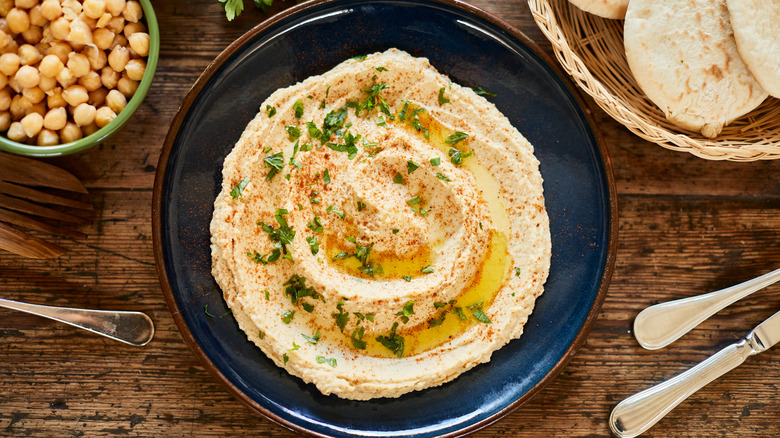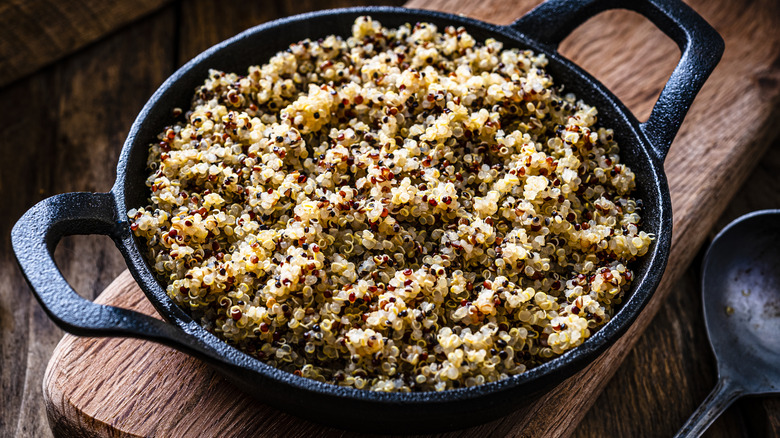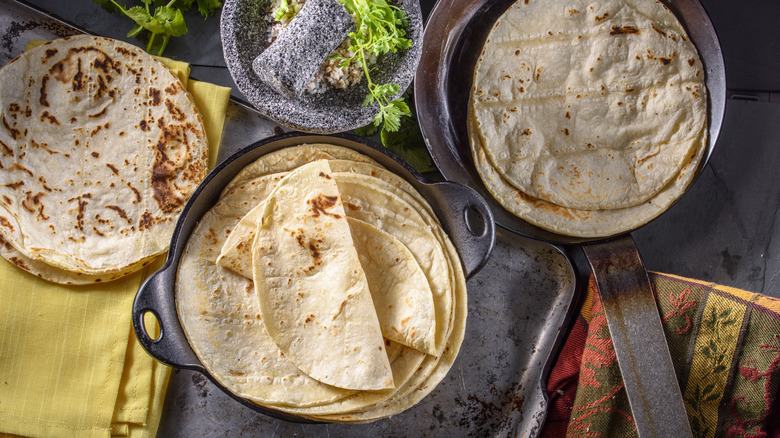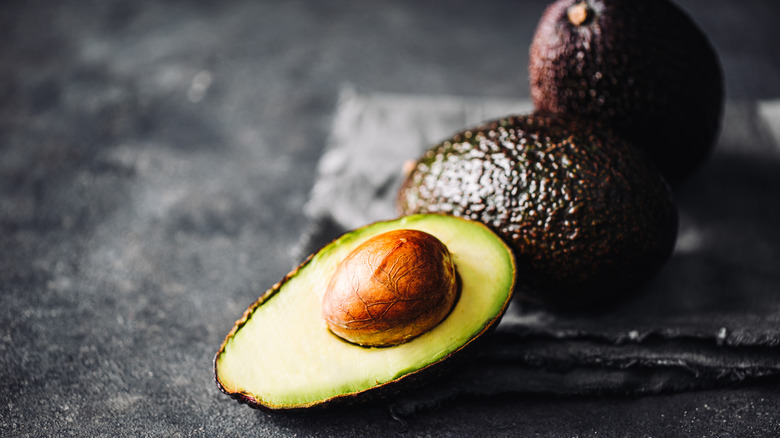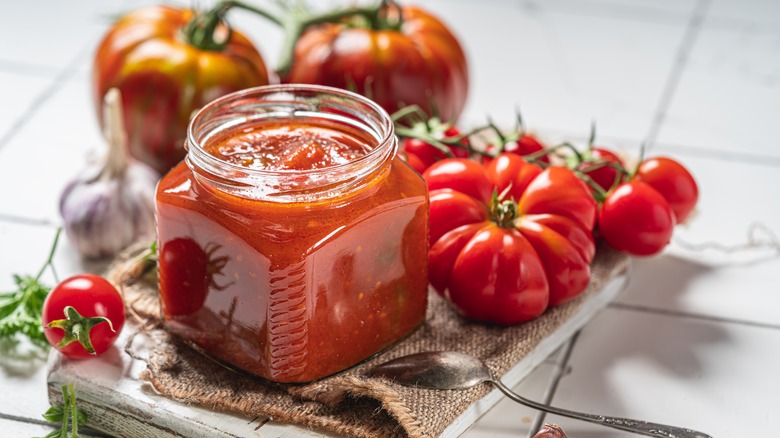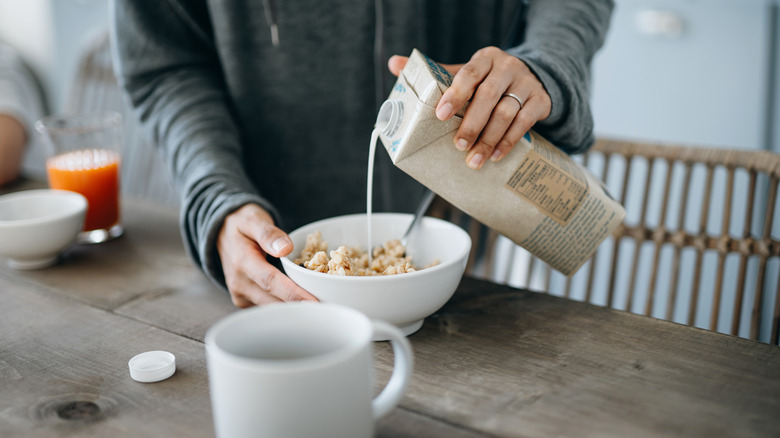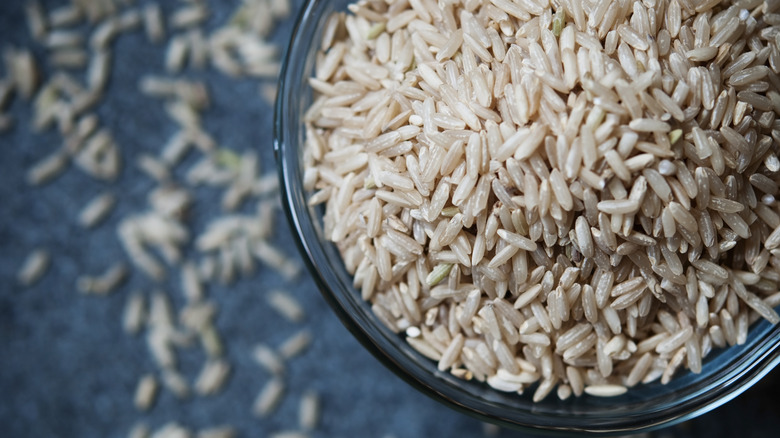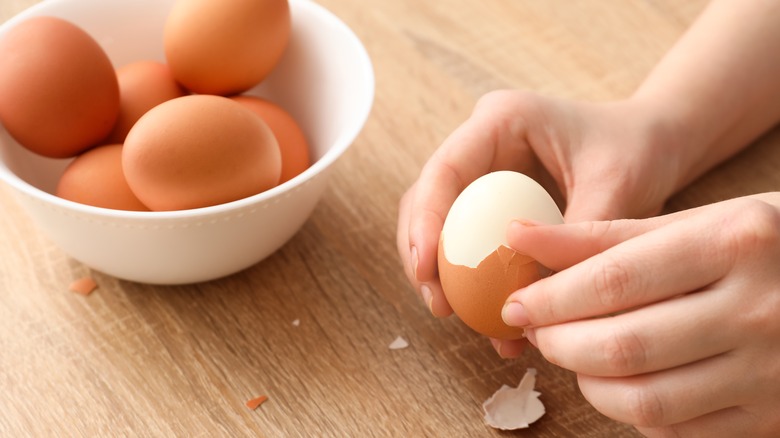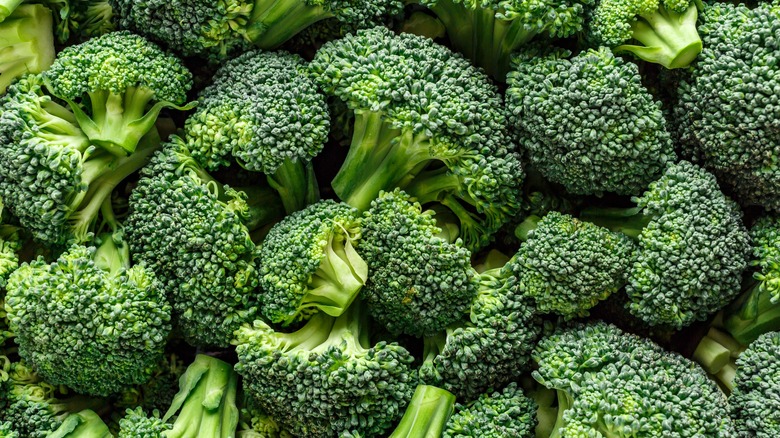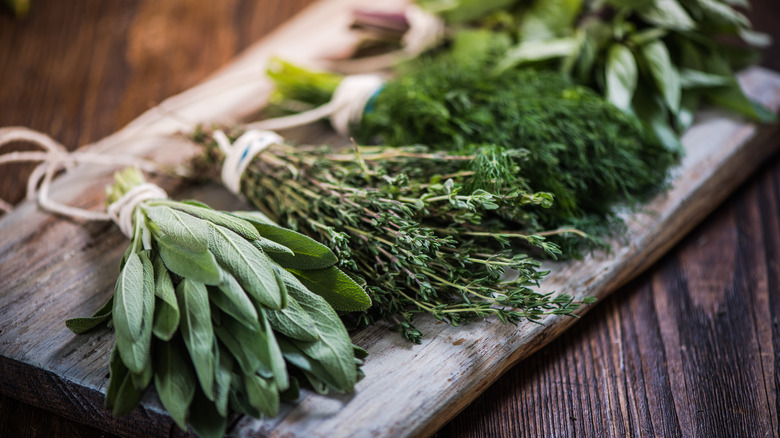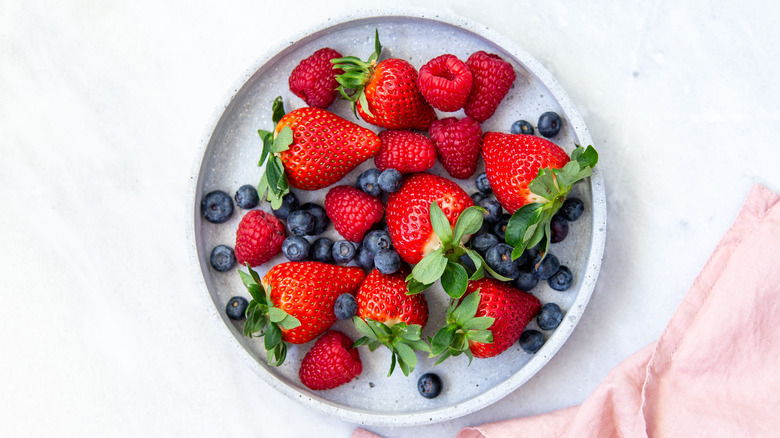14 Foods You Didn't Realize Will Spoil Fast (& How To Make Them Last Longer)
There are some foods you expect to spoil fast. For instance, you're not going to leave raw meat or a carton of milk languishing in your fridge for weeks. But then there are also foods you don't realize will spoil quickly. They're the ones that take you by surprise, potentially leading to wastage.
You look away for a second and your perfectly fresh berries have turned to mush or are covered in blue fuzz. Or you make the mistake of thinking that homemade tomato sauce will last in the fridge as long as store-bought sauce, only to find it moldy or foul-smelling after a handful of days. Not only can this put a damper on your dinner plans, but it can end up costing you money.
We've compiled this list of 14 foods you didn't realize would spoil fast — and information to help you make your grocery items last longer. So, not only will you be prepared to act quickly when you have them in your fridge or pantry, but you'll also know how to keep them good to eat for longer.
1. Hummus
Made from chickpeas and tahini, this classic Middle Eastern dip might seem like the kind of food that will last forever. But the truth is, hummus spoils much faster than you might realize — especially once it's open. On average, homemade hummus lasts three to four days in the fridge, while store-bought hummus lasts six to seven days in the fridge once opened. However, this can vary between brands. Some brands of hummus only last a couple of days in the fridge before spoiling.
But how will you know that your hummus is bad? You might see some bubbling or aeration throughout the dip. You might also notice discoloration, mold, or a bad odor. All these are signs that you should throw your dip out, rather than trying it and hoping for the best.
To keep it fresher for longer, store it in the fridge in an airtight container. This might mean transferring store-bought hummus into a more robust container with an airtight seal. You can also minimize the time it spends out of the fridge. Perhaps remove the amount you want to eat in a sitting and leave the rest in the fridge so it doesn't sit out.
2. Cooked grains
Rice, quinoa, bulgur, farro, and other cooked grains don't last very long in the fridge, and in a sealed container, they last just four to five days. If you're batch-cooking grains ahead of time, don't expect them to last for a full week of meals.
Cooked grains are prone to breeding harmful bacteria if not cooled and refrigerated properly. If you follow the correct cooling procedures, however, you'll minimize the levels of bacteria in the grains, meaning they'll last slightly longer in the fridge. You need to spread cooked grains out on a large plate or baking sheet, fanning them until they're cool. If left to cool in a pan, the temperature remains too high. This, paired with their moisture content, is an ideal breeding ground for bacteria.
As soon as you've cooled your grains, transfer them to an airtight container and store them in the fridge. If you want them to last longer than four to five days, you'll need to freeze them instead, and they'll stay fresh in a freezer for a few months.
3. Open tortillas
You open a pack of tortillas and eat a couple, putting them back in the pantry for later use, only to come back to them a few days later finding them starting to go crispy and cracked at the edges. While they can last a week or so at room temperature once opened, this is only if they're carefully wrapped in cellophane or stored in an airtight container. We've found they dry out in just a few days in an open package.
But, you can make them last longer. If you wrap them and store them in the fridge, they'll last for around three to four weeks. Alternatively, wrap each tortilla individually, then put all these individually wrapped tortillas inside a sturdy freezer bag and freeze them. They'll last in the freezer for six to eight months, which is great news if you only eat tortillas occasionally.
4. Avocados
It's easy to assume that avocados are going to last a long time, and it's common to buy them fairly underripe from the grocery store, especially if you don't live in an area where avocados grow. You get them home, put them in a fruit bowl to ripen, and think you have a week or two to use them.
The thing with avocados is that they can be tricky. They can go bad in anywhere from two to seven days, but they can also last significantly longer if you buy them before they're ripe. They can feel hard one day, only to reveal a brown, stringy mess the next. There's no great way of telling that an avocado is perfectly ripe just by looking at it. You'll generally notice the skin getting darker as it ripens, but it's best to give it a gentle squeeze to assess how ripe it is.
Once your avocado has reached a good level of ripeness, you can extend its lifespan by putting it in the fridge. A ripe avocado will likely last only a day or two at room temperature, but it'll last for up to a week if refrigerated. You shouldn't put avocados in the fridge before they're ripe, though, as they'll fail to ripen altogether.
5. Homemade juice
Freshly made juice is undeniably delicious, but if you're used to the shelf life of store-bought juice, you might be surprised at how quickly it spoils. Store-bought juices contain preservatives, which is why they last as long as they do. Without these preservatives, homemade juices last just 24 to 72 hours in the fridge, however, they tend to taste best if consumed within the first 24 hours. Juice made in masticating or cold press juicers tends to last longer — around two to three days — than juice made in centrifugal juicers, which stays fresh for around 24 hours.
You can make your juice last slightly longer by storing it in Mason jars, or other airtight glass containers. Juice stored in plastic jugs or bottles tends to oxidize more quickly than juice stored in glass. Ensuring your fridge is at the lower end of the ideal temperature range — which is 35 to 38 degrees Fahrenheit — can also help your juice stay fresh longer. Another consideration is the types of fruits you use in your juice. Those that contain acidic fruits are likely to last longer before they spoil. And, if this isn't enough, you can freeze fresh juice for up to six months.
6. Open wine
It's common to open a bottle of wine and not get through it in a single sitting. You might think you can stick the cork back in the bottle and return to it within a week or two, but wine is best consumed within one to two days of opening. After a couple of days, the flavors of the wine will start to deteriorate, so it won't be as good as it was when you first opened it.
It's worth noting that you should put a cork back in your wine and store it in the fridge, even if you're drinking the remainder within a day or two. This helps preserve its flavor. And, yes, you should even chill red wine once it is opened. You can always leave it to reach room temperature before drinking.
While there's no real way to make your wine last longer than this while still tasting good, you can use leftover wine to cook with. You can safely use wine to cook with for months past the point where it stops tasting good to drink. Sure, you might lose some of the nuances of the wine, but this happens during the cooking process anyway.
7. Homemade tomato sauce
If you're used to jarred tomato sauce, you may not realize how fast homemade tomato sauce spoils. While jarred sauce lasts up to a year in the cupboard and five to seven days in the fridge, once opened, homemade sauce spoils significantly more quickly. Homemade pasta sauce will last only three to five days in the fridge. While you can't extend its lifespan, you can ensure it lasts closer to five days by storing it in an airtight container.
You can tell your sauce has gone bad if it has a notably off odor or if it has grown mold. However, sometimes the signs that it has spoiled are more subtle, so check to see if it has a slightly sour smell or an off-taste to it (if you try a very small amount, it's unlikely to make you sick).
Want to make your homemade sauce last longer? You'll need to freeze it. If you seal it in an airtight container, it'll last up to six months in the freezer. Any longer than that and it won't taste its best.
8. Open soy milk
Soy milk that comes in shelf-stable packaging can last for years before it reaches its best-before date. So, it would be reasonable to assume that soy milk lasts ages once it's open in the fridge. After all, it isn't dairy, so what could go wrong? Well, it actually spoils much faster than you might realize. Once open, you can only expect it to stay fresh for five to 10 days in the fridge. However, this varies between brands, so check the carton to see how long yours will last.
You'll know when soy milk has gone bad because it has a notably unpleasant odor. If you pour some out, you might notice that it has lumps in it, too. While you can safely freeze soy milk to extend its life, manufacturers note that it might affect the texture of the milk. It's better used in recipes or blended into smoothies after freezing and thawing than it is in coffee or drunk straight up.
9. Brown rice
Rice lasts for years, right? Well, that might be true of white rice, which can last for two years if properly stored, but brown rice is a different story. Because it isn't milled and has a higher oil content than its white counterpart, brown rice lasts only three to six months from its manufacturing date. Shocker!
To make sure it lasts as long as possible, store your brown rice in a dry place, such as your pantry. Once the packaging is open, transfer it to an airtight container. This not only keeps moisture out but prevents bugs from making their home there. You might be wondering how you'd even know that your brown rice had spoiled. Aside from obvious signs — such as mold, moisture, and bugs — you should check for bad smells, an oily texture, or discoloration. These factors could be telling you that it's time to replace that old bag of brown rice that's been sitting in your kitchen cabinet for some time.
10. Hard-boiled eggs
Considering how long uncooked eggs last, it makes sense to assume that hard-boiled eggs will last a long time in your fridge. But, before you batch cook a whole load to enjoy as snacks for the next couple of weeks, you should know that they only last seven days in the fridge. This is the same whether you peel them or leave them in their shells. However, if you peel them, we'd recommend storing them in an airtight container. You can tell when hard-boiled eggs are past their best, not only because they'll start to smell bad, but because the egg white may start to take on a grayish tinge.
While you can't really make them last any longer, it's important to refrigerate them within two hours of cooking. If you don't, they may spoil significantly quicker, so it's impossible to know whether they're safe to eat at all. Once they've been refrigerated, you shouldn't keep them at room temperature for longer than two hours before either eating them or returning them to the fridge.
11. Broccoli
Some veggies seem to last weeks when refrigerated, but broccoli isn't one of them, and it generally only lasts around five days in the fridge. After this time, you might start to notice some pale patches and discoloration. While it's safe to eat with slight discoloration, it isn't at its best. It'll also soon go on to turn brown in places and can even get slimy or moldy. Once you notice any brown parts on your broccoli, it's no longer good to eat.
Broccoli likes plenty of airflow around it, so help it last longer, try not to cram it in a packed crisper drawer. If it came wrapped in plastic, you should also remove it. Another way to extend its lifespan is to cut a little off the stem, and then place it stem-down in an inch or so of water. Storing it this way (like a broccoli bouquet) can help it last significantly longer. You can also freeze broccoli florets if you need to. Their texture will be slightly more mushy when defrosted and cooked, so frozen broccoli is best used in soups or other recipes where texture isn't so important.
12. Fresh herbs
Depending on how old they were when you bought them and the type of herb, you might find your fresh herbs turning to mush in the fridge in less than a week. Soft herbs, such as cilantro and parsley, have a much shorter lifespan than woody herbs, such as rosemary and thyme. Woody herbs can last for up to three weeks, while soft herbs last around seven days.
Generally, you should keep your fresh herbs in the fridge. The exception to that rule is basil (and some thin-leaved types of mint). This can bruise and brown more easily in the cold and should be kept at room temperature in a glass of water, like a bouquet. You can store other soft herbs this way, but pop them in the fridge to make them last even longer. Alternatively, store your herbs wrapped in a damp paper towel in a Ziplock bag in the crisper drawer of your fridge. You can also freeze herbs, but it will affect their texture and flavor.
13. Berries
Fresh berries have a relatively short lifespan, and their longevity can depend on various factors such as the type of berry and how they are stored. On average, fresh berries like strawberries, blueberries, raspberries, and blackberries last around three to seven days in the refrigerator. However, this can vary based on their ripeness and the conditions in which they were purchased.
You can tell that fresh berries have gone bad if you notice signs of mold, an off-putting smell, or a mushy texture. Discard any berries that appear discolored, slimy, or smell bad. To make fresh berries last longer, make sure they're washed and dried when you store them. Keep them in the refrigerator in a container lined with paper towels to absorb moisture that can make them spoil faster. Regularly inspect the berries for any signs of spoilage and remove any that have started to go bad to prevent the spread of mold.
If you've purchased a large quantity and won't consume them within a few days, consider freezing the berries. Spread them on a tray in a single layer to freeze them before transferring to a freezer bag. They will lose their firm texture after defrosting, but they're great for baking or in smoothies.
14. Iced tea
According to the CDC (via Food Safety News), it's recommended to keep iced tea in the fridge for no longer than eight hours. How's that for spoiling faster than you expected? However, before you panic, this guideline was likely intended for commercial producers. For those who prefer to strictly follow these kinds of rules, by all means, throw your iced tea out after eight hours. However, in practical terms, homemade iced tea typically remains good for about three to four days when stored in the refrigerator. That said, it tastes best when consumed within a day. Storing it in an airtight container in the fridge helps prevent oxidation so it maintains a great flavor for longer.
It's worth noting that cold brew teas have a lower likelihood of bacterial buildup compared to teas brewed with hot water or using the sun tea method. Therefore, if extending the lifespan of your tea is a priority, you might want to consider preparing it using the cold brew method by simply steeping your tea in cold water in the fridge. This way of brewing can contribute to a longer shelf life while maintaining a refreshing taste.

